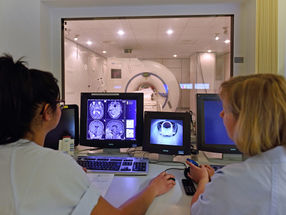120,000 Swedish Twins Could Help Unlock the Secrets of the World's Diseases
AstraZeneca to Collaborate with the Karolinska Institute on New Bio Bank
Advertisement
Drug discovery just got a boost at AstraZeneca, where a new collaboration with the Karolinska Institute will give the global pharmaceutical company access to a unique collection of medical and environmental exposure information from a database of more than 120,000 Swedish twins. As the first corporate sponsor, AstraZeneca will provide the Swedish Twin Registry with a grant to fund the archive for five years, in addition to internal research expertise. In exchange, the Karolinska Institute will provide AstraZeneca with non-exclusive access to the data-rich registry, which will be expanded to include anonymous genetic samples and made available to the wider academic community.
"Our collaboration with the Swedish Twin Registry is especially significant because it provides our company with medical information and, in the future, genetic information in all of the research areas in which AstraZeneca is involved," said Jan Lundberg, Head of Global Discovery, AstraZeneca. "Furthermore, this registry represents a unique epidemiological source that can help us design future studies to verify candidate genes, validate regions of genetic linkage, estimate heritability, quantify the magnitude of disease risk and explore genetic and environmental interactions."
Studying the medical histories of twins can be incredibly useful in healthcare research. Identical (monozygotic) twins have genetic codes that are identical. Therefore, if one twin is exposed to different environmental experiences than the other, researchers can explain more precisely why one individual suffers from a disease while the other does not. Similarly, in fraternal (dizygotic) twins, where the genetic codes are not more similar than between siblings of the same age and from the same environment, researchers can analyse and see if the cause of disease in one twin is related to a particular gene.
The registry currently details only medical histories and environmental exposures for the twin pairs. The Institute has plans, however, to acquire blood samples from as many pairs as are willing to participate to provide a genetic archive as well. In order to expand the registry to include genetic samples from the twins, the Karolinska Institute will be following its strict guidelines involving full disclosure and informed consent for patients, in line with the Institute's time-honoured ethical principles in medical research.
"The Swedish Twin Registry is at present the largest twin registry in the world, with information on twin births in Sweden dating from as long ago as 1886, " said Hans Wigzell, President, Karolinska Institute. "As we enter the 21st century, it is only appropriate that we expand the registry to include genetic information, so that the registry can contribute to the advancement of medical research, which promises to usher in a new wave of discoveries in human health."
The registry was founded in the late 1950s to serve as an epidemiological resource for studying the influence of tobacco use and other exposures on cancer, cardiovascular and respiratory diseases, and mortality. Since the early 1980s, research on the registry has been expanded to address questions of about the around impact of genetic and environmental factors for a wide variety of diseases and behavioural outcomes, including aspects of aging and development. Molecular genetic studies, which focus on evaluating associations of candidate genes with diseases and disorders, and studies of gene-environment interaction are a new focus of research on the registry.
Much of the information collected for the registry is based on responses to postal questionnaires collected in the 1960s and 1970s. Thus, exposure and disease status information is available on some 25,000 like sexed pairs born in 1958 or earlier. The registry is updated regularly with information from the cancer registry, the inpatient registry, and the cause-of-death registry. A new study called the Screening Across the Lifespan Twin Study (SALT), in which all twins born in 1958 and earlier are being invited to participate in computer- assisted interviews, is designed to screen for the most common and complex diseases. This survey will be finished during the spring of 2002, and over 42,000 twins are expected to participate. For the like-sexed twins, this contact will represent a follow-up 28-32 years after the first collection of information. The information will allow researchers to perform unique prospective analyses of how exposures during the 1960s influence our health today. AstraZeneca is a major international healthcare business engaged in the research, development, manufacture and marketing of prescription pharmaceuticals and the supply of healthcare services. It is one of the top five pharmaceutical companies in the world with healthcare sales of over $16.4 billion and leading positions in sales of gastrointestinal, oncology, anaesthesia (including pain management), cardiovascular, central nervous system (CNS) and respiratory products. In R&D, AstraZeneca employs more than 10,000 people at nine sites in five countries, and in 2001, invested $2.7 billion.

























































